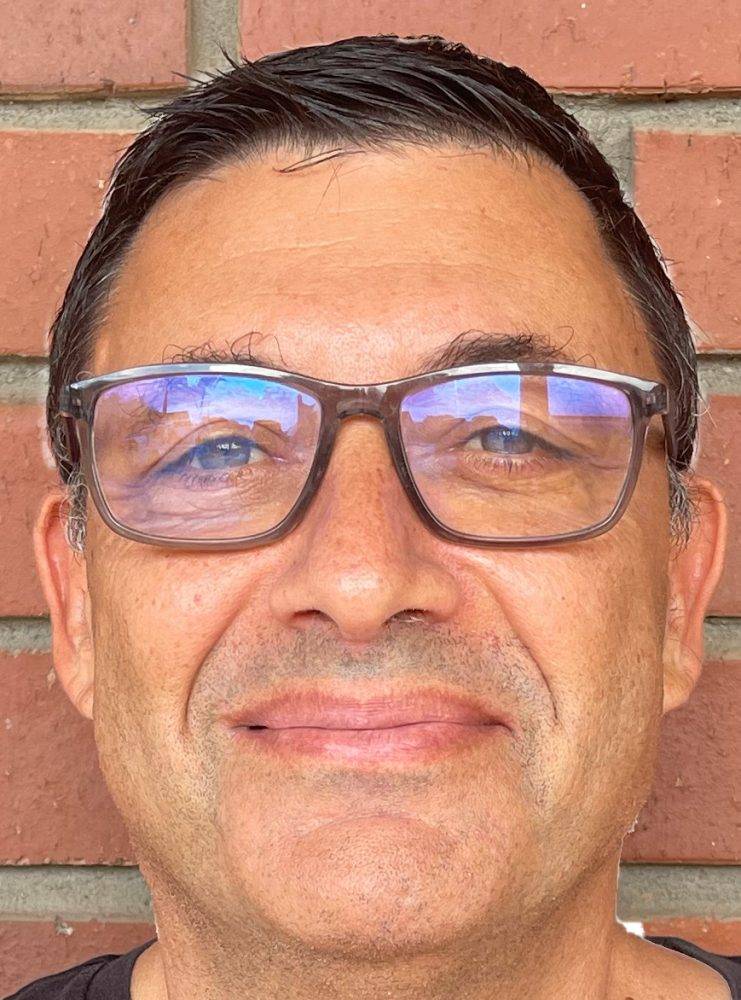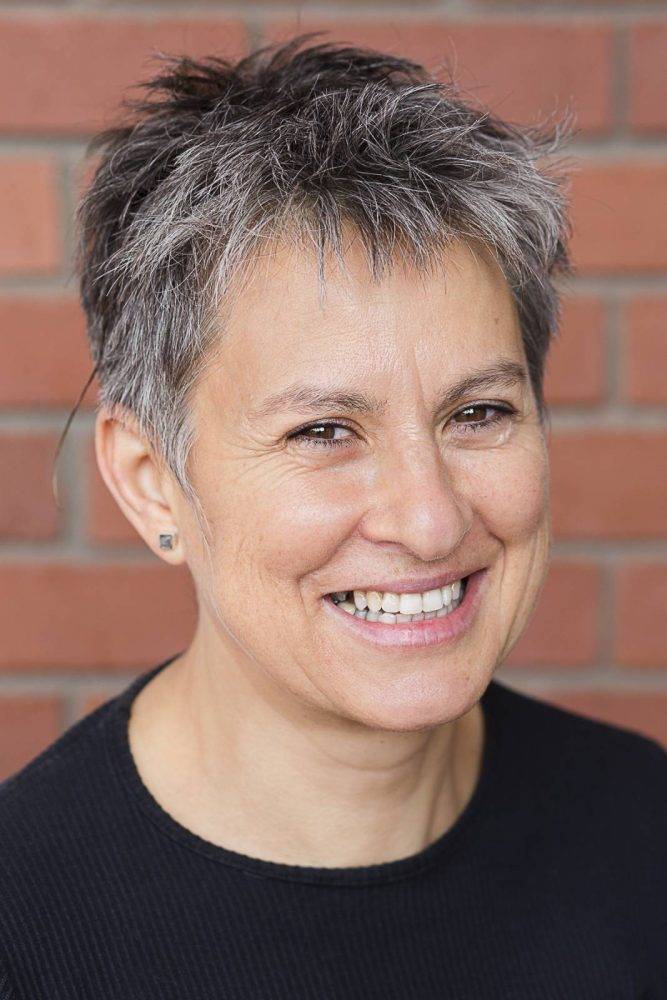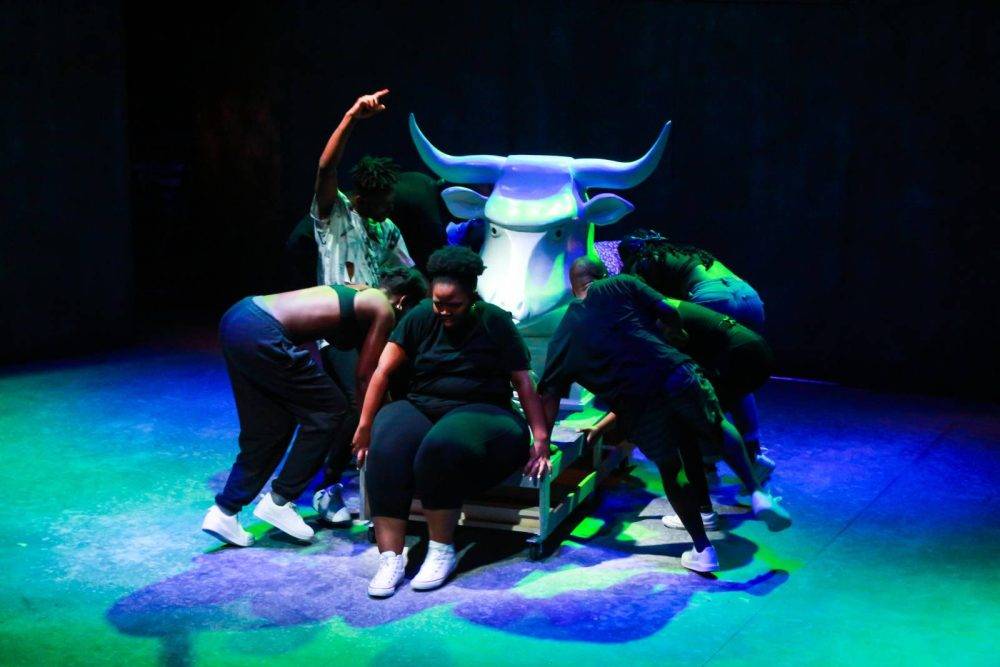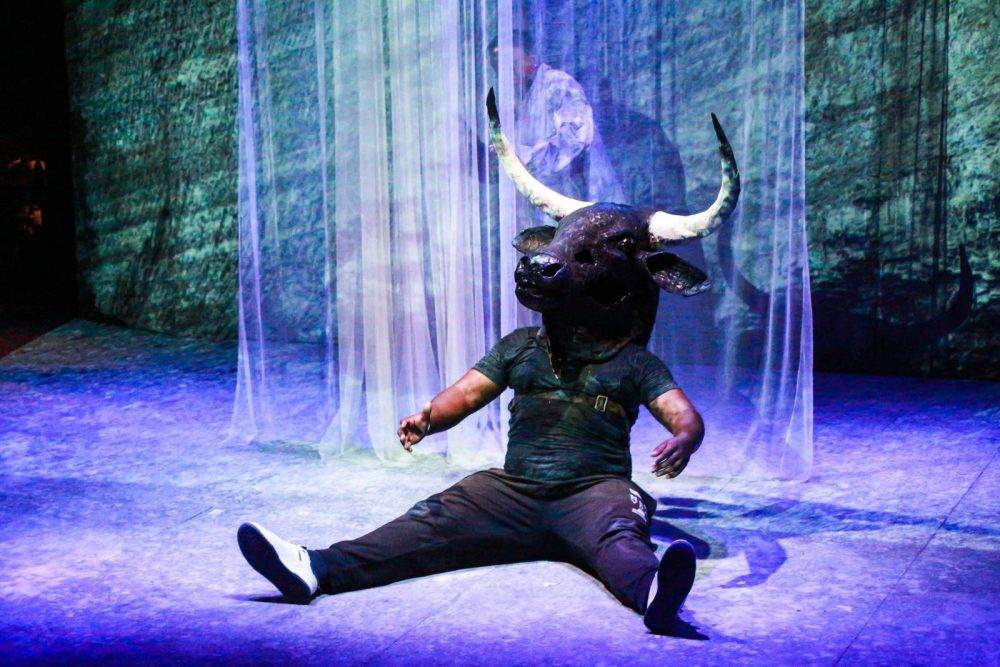A from mAnJE! MaNJe (an epic), which uses ancient stories as a lens through which to explore the human condition in an age of rapidly evolving technology, big data, AI and climate change catastrophe.
It was suffocatingly hot in the warehouse-style Magnet Theatre at the Old Match Factory in Observatory, arguably Cape Town’s most diverse and downright eccentric neighbourhood.
Minutes before, in a New Agey cafe around the corner, I’d inhaled evidence of this bohemianism while having breakfast near a man smoking a joint with his morning coffee.
That anti-establishment spirit was also alive and well in the theatre, where a mix of actors, singers, musicians and technicians went through their pre-performance motions: vocal warm-ups, running lines, mic checks, rehashing dance moves, bouncing, swaying, rolling on the floor … the usual chaos and high-energy mix of excitement and nerves you expect to see backstage before a show.
I’d come to watch a rehearsal run of mAnJE! MaNJe (an epic), a new production from the crack squad working with Magnet’s founders, Mark Fleishman and Jennie Reznek, who have for nearly four decades devised their own unique brand of theatre, much of it sufficiently innovative to defy easy categorisation.
For 90-odd minutes, this gifted cast performed their hearts out as I looked on in awe, captivated from the first stirring notes of composer Neo Muyanga’s score, a haunting melancholy consuming the room as Brydon Bolton strummed his double bass and Lungiswa Plaatjies clacked her marimba sticks.


 Innovative: (Left to right) Musician Lungiswa Plaatjies, director Mark Fleishman and narrator Jennie Reznek are part of the magic of mAnJE ! MaNJe (an epic), which is on at the Magnet Theatre in Observatory, Cape Town.
Innovative: (Left to right) Musician Lungiswa Plaatjies, director Mark Fleishman and narrator Jennie Reznek are part of the magic of mAnJE ! MaNJe (an epic), which is on at the Magnet Theatre in Observatory, Cape Town.
Then came the impassioned, natural harmonising of the Magnet Theatre Youth Company’s tight-knit chorus, the exquisite vocal gymnastics of opera singers Zolina Ngejane and Luvo Rasemeni, the animations by Marcus Neustetter projected huge across the screen at the back.
And, of course, the stories so gorgeously narrated by Reznek and fellow actor Mwenya Kabwe.
Their voices were like a machine that enabled me to travel across time, their words connecting ancient, vaguely familiar myths with some sort of terrifying, utterly unknowable sci-fi future.
And, woven into all of it, like Ariadne’s golden thread, prophetic allusions to our current moment: the warming planet, the unchecked rise of technology, humanity’s plight in the face of a digital take-over …
These were tales as old as time, ones that cast deep, often dark, shadows across the ages. And by the end of it, I felt duly chastised, the result perhaps of being part of the status quo, or feeling at least slightly complicit in humankind’s collective passivity.
Unfolding in the manner of an epic — multiple episodes that don’t necessarily logically cohere — mAnJE! MaNJe is an expansion of an earlier project This Death Here… that Reznek and Fleishman created as an 11-minute epic for William Kentridge’s Centre for the Less Good Idea. Fleishman, who directed it, called Kentridge’s brief “confounding” because “how do you make an epic in 11 minutes?”
But it was a challenge worthy of resolving and from the ideas they played around with emerged a core insight from the “Ode to Man” speech in Antigone, that humans can do many fantastic things, but not defeat death. Woven into that was the central figure of Daedalus, the ancient Greek inventor and engineer who suffered tragic consequences when his son Icarus flew too close to the sun.
In true collaborative spirit, many of the ideas they developed for that performance drew on Neustetter’s illustrations for the show’s backdrop animations.
“Marcus started to draw landscapes that weren’t like our natural world but that seemed to have evolved out of a new set of organisms,” said Fleishman. “Instead of a natural environment it was a machine world.”
It was an 11-minute theatrical experiment that, among other things, contemplated an evolutionary path that did not necessarily culminate with humans. mAnJE! MaNJe has evolved out of that to become a full-scale production that prophetically laments the human condition in the age of machines, big data, AI and climate catastrophe.
“We’re digging in the territory of these ancient stories and finding resonance with our current reality,” said Reznek when we spoke after the run-through. “Something Magnet’s done a lot is to take ancient stories that have survived in people’s imagination because they speak thematically to something profound about our human condition.
“And we anchor what we want to say about the current moment in those old stories.”
Rooted in Greek mythology, mAnJE! MaNJe might be a repurposing of ancient ideas, but they are given an urgent, revolutionary spin, rewired and refurbished and filtered through a contemporary lens.
Its themes are urgent. It raises the spectre of the manifold potential threats let loose in the form of technological advances we’re unable to fully comprehend or to predict the ramifications of.
It’s a new story anchored in an ancient tale, said Fleishman. “Daedalus loses his son through his own kind of hubristic belief that he can do what other people can’t do.
“It’s the idea of trying to transgress against human nature and fly.”
“I think in this piece, the character of Daedalus is absolutely an analogue for the likes of Elon Musk,” said Reznek.
“He’s a stand-in for those tech guys who celebrate humankind’s incredible advances. But what’s frightening is that when the Nobel Prize for Science went to the creators of AI, they themselves expressed uncertainty about it. They’ve said we need to pause because we cannot calculate what the future of AI might be responsible for.”
“The pace of technological change is terrifying,” said Kabwe, the Zambian-born actor who, with Reznek, co-wrote the mAnJE! MaNJe text. “Considering how fast things are moving, we have no capacity to anticipate what kind of world our children will be living in. We’re so slow in the wake of what feels like an AI tsunami. If only we could pause the whole thing a bit — which is what Hermes tried to do and failed — so we can just, like, catch our breath. It’s the ‘just-keep-goingness’ of it which gives me heart palpitations. We seem to be in free fall, incapable of taking time to consider what we’ve done.”
Taken literally, “manje manje” translates to “now-now”, perhaps the most South African of all South Africanisms.
“Now-now can refer to something that happened in the past,” said Fleishman. “Or, if we say, ‘It’s going to happen now-now,’ we mean it’s going to happen soon in the future.”
It’s a paradoxical phrase that rather cleverly parallels our human condition at a time when everyone seems to be distractedly going with the flow, twiddling with phones and ignoring the pace at which technology is getting the upper hand.
The title also alludes to the multiple ways in which this invocation of ancient myths plays with time, and with Fleishman’s idea that the future is already inscribed in the past, encoded into the matrix of history.
“For a long time, I was very interested in the way the past impacts the present,” he said. “With this piece, we’re thinking about how the past impacts the future rather than imagining that the present just happens to be in the way.”
The show, by the very nature of its format and shape, seems revolutionary, groundbreaking. There’s a newness to it, a freshness in the way it draws together multiple storytelling strands to present something so relevant to the present moment.

 Shadowy future: Scenes from mAnJE! MaNJe (an epic), which uses ancient stories as a lens through which to explore the human condition in an age of rapidly evolving technology, big data, AI and climate change catastrophe.
Shadowy future: Scenes from mAnJE! MaNJe (an epic), which uses ancient stories as a lens through which to explore the human condition in an age of rapidly evolving technology, big data, AI and climate change catastrophe.
There’s also a sense that, if you didn’t know you’re in boho Observatory, you might be in an amphitheatre in Greece 3 000 years ago, witnessing a ritual in which the old gods are being conjured in order to change the atoms in the room.
Reznek said this kind of hyper-experimental approach is something Magnet has done since the company did its first big collaboration with Jazzart in 1994.
“It was a dance theatre version of Medea and that felt as if it was something completely new. There was an excitement in the room — I had never seen anything like it. I feel similarly about this show and I’m still trying to understand what it is that we’re actually making.”
“Genre is a sticky thing,” said Fleishman. “It’s difficult to pigeon-hole. As soon as you say it’s one thing, everybody tells you it’s not.
“On one level, I think of it as a kind of operatic epic. It has an epic structure. And the word ‘opera’ in Latin simply means ‘a work’. So, it’s just a work.
“But it also has music and singing and one thing about opera is that you just accept that it’s a kind of crazy world and often jumps from one scene to another because you’re just going with the music. So, there are those parallels here, too.”
Fleishman also sees mAnJE! MaNJe as “a kind of concept album”, something he’s emphasised by dividing each of the epic’s episodic components — the scenes, if you like — into “tracks”.
“Each track is built around a musical platform on which we’ve developed a particular thematic investigation based around one of the characters from the story. We use Daedalus to sew them all together.”
As much as the epic form is taken from ancient Western modes of creating drama, Fleishman believes there are inherent links with African theatre practices.
“The epic is on some level a very African form. We have our bards, who are the griots, and there’s a distinctly African way of telling stories with music and dance interludes — it’s a kind of storytelling using a performance style that’s opposed to the dialogic kind of enactment that Western theatre does.”
It’s this multidimensional quality that I presume made watching the show, even in its early, not-quite-complete rehearsal state, so rich, intense and deeply satisfying.
And also, devastating. It resonated not only with the heaviness of our current predicament as a species, but with the weight of millennia, its message at once terrifying and deeply layered, shocking and profound.
The ancient storytellers knew only too well the consequences of human hubris and yet, like Icarus, contemporary tech-bro puppeteers like Musk seem hell-bent on flying too close to the sun.
And where does that leave us? What becomes of our future if we ignore the present? And if we dismiss the wisdom of ancient stories? “We’re in a tragic moment — you can’t pretend otherwise,” Reznek said.
And while nobody imagines that a performance in an intimate fringe theatre, in cannabis-choked Observatory, will necessarily alter the future or enable us to turn back time, mAnJE! MaNJe will at the very least touch your heart — and give pause for thought.
“Theatre provides a place of stopping for a moment to think,” she said. “That’s something AI is not going to do: just stop for a moment and consider what’s going on.”
“Art has that capacity to interrupt a kind of automatism,” Fleishman said. “Theatre does what, for most people today, is so difficult — it stops you for the next hour or so, makes you unavailable.
“It compels you to switch off your phone, sit in that bloody seat, and unless you want to make a fool of yourself, not walk out of the theatre. It asks you to spend some time with us while we show you something. It’s such a human community event.”
“I hope it allows some pause,” said Kabwe. “Just come to sit here and watch, with no expectations, so you can receive, witness and participate in this communal thing.
“It’s a way of being with other people in a shared moment. I hope that’s what people feel — that we’re here together. It’s just us together for an hour and a half.
“When you leave, it’s still going to be crazy out there. But for this moment we can hang out, be together for a while.”
mAnJE! MaNJe (an epic) is on at the Magnet Theatre in Observatory, Cape Town until 16 November.